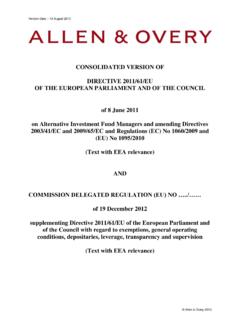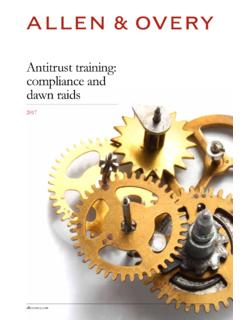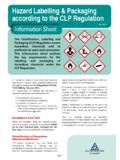Transcription of Preparing for the General Data - Allen & Overy
1 EU General data protection Regulation The EU General data protection Regulation | 20172 Allen & Overy LLP 2017A new data protection landscapeAfter over four years of discussion, the new EU data protection framework was adopted on 8 April 2016. It takes the form of a Regulation the General data protection Regulation (GDPR). The GDPR will replace the current Directive and will be directly applicable in all Member States without the need for implementing national legislation. It will take effect on 25 May 2018. However, as it contains some onerous obligations, many of which will take time to prepare for, it will have an immediate impact. Ever since the European Commission first proposed its text back in 2012, this legislation has attracted a huge amount of attention. It even appears to have been influencing decisions by the Court of Justice of the EU. Organisations across the EU and beyond have been frustrated by the increasing lack of harmonisation across the Member States, despite data flowing increasingly without boundaries.
2 There was a growing desire to get the GDPR agreed quickly, even if that meant that some of the detail is left for later. The EU institutions have certainly stepped up to the plate. Adoption of the GDPR marks a milestone in data protection laws in the Article 29 Working Party (WP29) which is composed of representatives of the EU national data protection authorities (DPAs) has been working on guidance on various GDPR provisions to help organisations prepare. The first guidelines on data protection officers, one-stop-shop and the new right to data portability were adopted on 5 April 2017. More guidelines are in the pipeline for 2017. This note summarises some of the highlights in the GDPR. Now that the GDPR has been adopted, the shape of the EU s future data protection framework is clear and preparations for implementing the new Regulation have begun. David Smith, special adviser to Allen & Overy .
3 A major step towards a Digital Single Market. Andrus Ansip, Vice President for the digital single market, European Commission The expanded territorial reach of the GDPR will offer a more balanced treatment between EU and non-EU data controllers. Nigel Parker Partner, Allen & you need to knowEXPANDED TERRITORIAL REACH The GDPR catches data controllers and processors outside the EU whose processing activities relate to the offering of goods or services (even if for free) to, or monitoring the behaviour of, EU data subjects (within the EU). Many will need to appoint a representative in the EU. The Recitals provide some helpful guidance. Offering goods or services is more than mere access to a website or email address, but might be evidenced by use of language or currency generally used in one or more Member States with the possibility of ordering goods/services there, and/or mentioning customers or users who are in EU.
4 Monitoring of behaviour will occur, for example, where individuals are tracked on the internet by techniques which apply a profile to enable decisions to be made/predict personal preferences, means in practice that a company outside the EU which is targeting consumers in the EU will be subject to the GDPR. This is not the case AND PRIVACY BY DESIGNThe GDPR places onerous accountability obligations on data controllers to demonstrate compliance. This includes requiring them to: (i) maintain certain documentation, (ii) conduct a data protection impact assessment for more risky processing (DPAs may compile lists of what is caught), and (iii) implement data protection by design and by default, eg data minimisation. data protection OFFICERSIn certain circumstances data controllers and processors must designate a data protection Officer (the DPO) as part of their accountability programme.
5 The threshold is (i) processing is carried out by a public authority, (ii) the core activities of the controller or processor consist of processing which, by its nature, scope or purposes, requires regular and systematic monitoring of data subjects on a large scale, or (iii) the core activities consist of processing on a large scale of special categories of DPO will need sufficient expert knowledge. This will depend on the processing activities for which the officer will be responsible. The DPO may be employed or under a service contract. A group of undertakings may appoint a single DPO (conditional on accessibility by all), as may certain groups of public authorities. The WP29 guidance issued in April 2017 clarifies various things, including that in principle the DPO should be located in the EU and should report directly to the highest management level. Many companies are re-examining their processes and procedures now in order to ensure compliance.
6 Nigel Parker Partner, Allen & OveryThe EU General data protection Regulation | 20174 Allen & Overy LLP 2017 CONSENTC onsent must be freely given, specific, informed and unambiguous. Requests for consent should be separate from other terms, and be in clear and plain language. A data subject s consent to processing of their personal data must be as easy to withdraw as to give. Consent must be explicit for sensitive data . The data controller is required to be able to demonstrate that consent was given. Existing consents may still work, but only provided they meet the new conditions. There has been much debate around whether consent provides a valid legal ground for processing where there is a significant imbalance between the data subject and data controller. The GDPR states that in assessing whether consent has been freely given, account shall be taken, for example, of whether the performance of a contract is made conditional on the consent to processing data that is not necessary to perform that contract.
7 This may affect some e-commerce services, among others. In addition, Member States may provide more specific rules for use of consent in the employment context. The Recitals add that consent is not freely given if the data subject had no genuine and free choice or is unable to withdraw or refuse consent without detriment. Where personal data is processed for direct marketing the data subject will have a right to object. This right will have to be explicitly brought to their topic of huge debate relates to parental consent being required for children to receive information society services. The compromise (that Member States can lower the age from 16 to 13) will result in a lack of harmonisation and companies who operate across several Member States generally choosing to meet the highest standard. The Recitals provide, however, that parental consent is not required in the context of preventative or counselling services offered directly to a OF data PROCESSORS One of the key changes in the GDPR is that data processors have direct obligations for the first time.
8 These include an obligation to: maintain a written record of processing activities carried out on behalf of each controller; designate a data protection officer where required; appoint a representative (when not established in the EU) in certain circumstances; and notify the controller on becoming aware of a personal data breach without undue delay. The provisions on cross border transfers also apply to processors, and BCRs for processors are formally recognised. The new status of data processors will likely impact how data protection matters are addressed in supply and other commercial PROCESSING NOTICES data controllers must continue to provide transparent information to data subjects. This must be done at the time the personal data is obtained. However, existing forms of fair processing notice will have to be re-examined as the requirements in the GDPR are much more detailed than those in the current Directive.
9 For example, the information to be provided is more comprehensive and must inform the data subject of certain of their rights (such as the ability to withdraw consent) and the period for which the data will be stored. Controllers will need to consider their forms of fair processing notice with these new obligations in mind, and check in that they are providing the information in a clear way and in an easily accessible BREACH NOTIFICATION data controllers must notify most data breaches to the DPA. This must be done without undue delay and, where feasible, within 72 hours of awareness. A reasoned justification must be provided if this timeframe is not met. In some cases, the data controller must also notify the affected data subjects without undue expect guidance from the WP29 on data breach notification in the second half of text looks burdensome on both data controllers and DPAs.
10 However, in some sectors, organisations already have an obligation to notify data , the UK ICO, for example, already expects to be informed about all serious breaches. The text also contains a welcome threshold. Notification does not need to be made to the DPA if the breach is unlikely to result in a risk to the rights and freedoms of individuals. The threshold for notification to data subjects is that there is likely to be a high risk to their rights and freedoms. While this may lessen the impact, all companies will have to adopt internal procedures for handling data breaches in any GDPR establishes a tiered approach to penalties for breach which enables the DPAs to impose fines for some infringements of up to the higher of 4% of annual worldwide turnover and EUR20 million (eg breach of requirements relating to international transfers or the basic principles for processing, such as conditions for consent).












